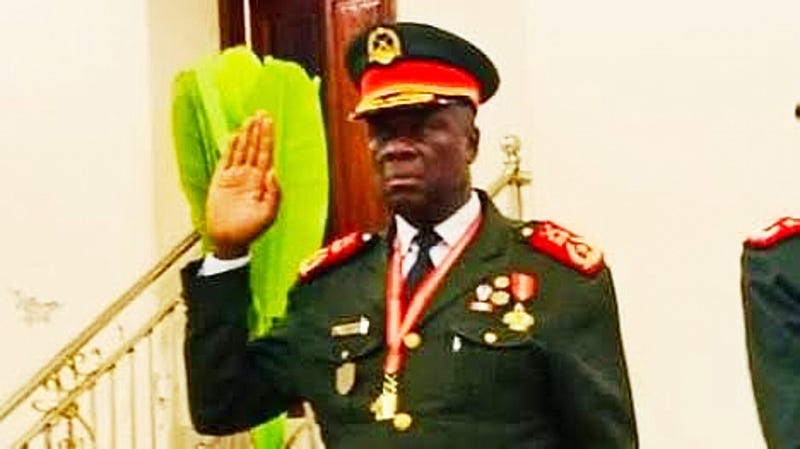
BISSAU, Guinea-Bissau (AP) — Soldiers in Guinea-Bissau on Thursday announced a new junta leader, cementing a forceful takeover of power that began after a disputed presidential election, in what the main opposition candidate called a ploy to prevent him from taking over power.
The military high command in the West African nation inaugurated Gen. Horta Inta-A as the head of the military government, which will oversee a one-year transition period, according to a declaration broadcast on state television.
Hours after the opposition called for protests against the coup and to demand the publication of election results earlier scheduled for Thursday, the military authorities issued a statement banning public protests and “all disturbing actions of peace and stability in the country.”
Guinea-Bissau, one of the world’s poorest countries, has been dogged by coups and attempted coups since its independence from Portugal more than 50 years ago, including a coup attempt in October. The country of 2.2 million people is known as a hub for drug trafficking between Latin America and Europe, a trend that experts say has fueled its political crises.
“The inability of political actors to stem the deterioration of the political climate ultimately prompted the intervention of the armed forces,” said Inta-A, who was the army chief of staff until the coup and a close ally of deposed President Umaro Sissoco Embaló.
The military authorities said Embaló and other prominent people arrested during the coup were in good health and would remain in custody. They did not say how many were arrested in all.
The Chairperson of the African Union Commission Mahmoud Ali Youssouf condemned the coup, calling for unconditional release of Embaló and other detained officials and for the respect of the electoral process.
West Africa’s regional bloc known as ECOWAS also held an virtual meeting of heads of state where it condemned the coup and Embalo’s “unlawful detention.” “Our response will be firm, principled, and consistent with our history,” said Sierra Leone President Julius Maada Bio, who serves as ECOWAS chairman.
Several other countries including France condemned the coup and called for respect for the constitutional order.
The opposition, meanwhile, alleged Embaló had fabricated the coup to avoid an election defeat in Sunday's closely contested presidential vote.
The military takeover and the reported arrest of Embaló were “fabricated” to disrupt election results, according to his rival Fernando Dias, who, like Embaló, claimed to have won the vote.
The Associated Press could not independently verify the claims by Dias, a member of the Social Renewal Party.
Activities returned to normal in the capital Bissau on Thursday, with businesses and public transport gradually picking up.
The latest in a string of coups
The coup is the latest in a surge of military takeovers in West Africa, where democracy recently has been challenged by disputed elections that analysts say could embolden militaries.
It followed presidential and legislative elections which were held at a critical time for the African country as Embaló, a 53-year-old former army general, faced a legitimacy crisis. The opposition said his tenure had long expired and refused to recognize him as president.
The coup and past ones in Guinea-Bissau are tied to “how much (state) institutions have been undermined and weakened,” said Beverly Ochieng, a senior security analyst at the consultancy Control Risks. Under Embaló, she said, “the legislature was dissolved unilaterally, the judiciary was operating under capacity, and there were deep-seated sentiments around political influence.”
Gunshots rang out in the main city of Bissau on Wednesday just days after the tense presidential election, which Embaló and Dias both claimed to have won.
In a scene that has become familiar in the region, military officers appeared on state television and claimed they had seized power while the election commission’s office was sealed.
Dias, 47, said in a video statement that he escaped custody "through a back door” after reports he was arrested by soldiers. He vowed to fight back.
“Umaro lost the elections, and instead of accepting the result, he fabricated a coup d’état,” Dias said. “Once again, we, we have been the target of a false coup d’état. ... We will liberate ourselves.”
The military officers who announced they had deposed the president cited the “discovery of an ongoing plan ... to manipulate electoral results," according to a spokesperson, Dinis N’Tchama, who was flanked by others during the televised statement.
The “scheme was set up by some national politicians with the participation of a well-known drug lord, and domestic and foreign nationals,” N’Tchama said.
___
Asadu reported from Abuja, Nigeria.